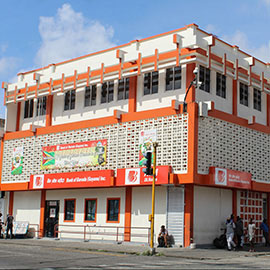Government’s lobbying for the Bank of Baroda to remain in Guyana may have influenced it to stay and Minister of Finance Winston Jordan says that it is likely to see many future rewards with first oil on the horizon, a number of foreign companies opening businesses here and no international bank offering competition.
“We approached, via the Governor of the Bank of Guyana (BoG). I had asked him to find out the reason why the bank was pulling out and the environment with Guyana. We asked the Governor to use whatever persuasion to show them why they should stay,” Jordan told this newspaper.
“We would play a role, generally, in these instances where something like that could send the wrong impression… We didn’t offer anything beyond that Guyana is a good place and the outlook would outweigh anything negative,” he added.
He lauded Governor of the Bank of Guyana Dr. Gobind Ganga for his efforts, while noting that after discussions the Governor reported that the bank made the decision to “rescind the pullout.”
Jordan said government understood that some banks may find the operating environment in Guyana challenging. “Many are finding it too cumbersome in markets like ours. They didn’t need the risk and the margins are too small,” he said. “Baroda has been around for quite a while. They were here when we had Chase Manhattan, Barclays, and also had Royal Bank of Canada. So, in essence, they are one of only two that while everybody pulled out, Baroda and Scotia stayed. They were the only two international, non-domestic banks left. Baroda, they have their international corresponding banks and so on. That will assist in many ways,” Jordan said.
The Finance Minister believes that Baroda’s decision to stay will also serve to attract other foreign banks looking to establish here. “That is a big plus for them and it will also signal for others who wanted to come and dissuade and change their perceptions. Baroda’s presence represents non domestic, non-regional and served so many benefits. If both Baroda and Scotia pulled out, we would have had only regional and local banks. It would not have been good because you would have found that it would be extremely stressful doing business, like we had already found. It would have been very costly to send money, to receive and open letters of credit and the list goes on. This would now send a positive message to other banks who were so minded, but who might not have been persuaded,” he added.
In December of last year, the Bank of Baroda sought bids from investment bankers to carry out the sale of its Guyana-based subsidiary.
According to the Financial Express “The objective of this assignment is to sell/disinvest Bank of Baroda’s entire 100% stake in its subsidiary BOBGI (Bank of Baroda Guyana Inc.) through investment bankers,” the bank said in a bid document.
According to the report, the Guyana subsidiary’s total business stood at GYD14,560 million (nearly $70 million) at the end of September 2018, down from GYD 20,576.5 million at the end of March 2017 and GYD 21,092 million at the end of March 2016.
The report said the sale was part of a strategy to exit relatively less remunerative international markets by the bank, which continues to call itself ‘India’s international bank’. “Pursuant to the Government of India’s directives in respect of rationalisation of overseas operations of Public Sector Banks in India, Bank of Baroda India (BOBIN), decided to divest its banking activities from certain countries,” a statement from the bank explained.






